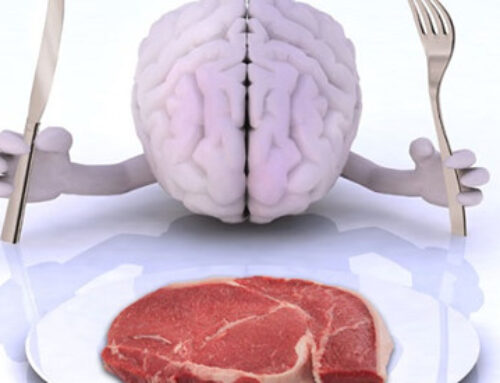Reduced brain function does not have to be a natural part of aging. Certain foods—sugar in particular—can cause damage to our brain’s tissues and speed up cognitive decline, which can lead to Alzheimer’s disease. This New Year, I challenge you to reduce your sugar consumption and increase your overall mental health.
I never used to worry about my brain function, but lately I am hearing more and more about the increase in Alzheimer’s disease and how cognitive decline is accelerating across our population. Maybe I should worry. Maybe we all should worry! I have been blessed with an excellent memory and I would sure hate to lose any of my brain function.
Some of us age well, without any obvious problems with our brain function—these are the individuals who are still doing research, writing books, living life without cognitive decline well into old age, and dying with a sharp mind. Who doesn’t want that? We think aging and deterioration of the brain are synonymous. Some of us, though we dread it, might even expect it. I have other plans for myself. I intend to do all I can to make sure my brain function stays sharp and I don’t think anyone should accept cognitive decline as a normal part of the aging process.
There are many reasons we start to lose brain function: inflammation, neurotoxicity due to heavy metal poisoning (mercury tooth fillings, for example), environmental toxins, and, the biggest factor of all, our diet. What we eat and digest is incorporated into the tissues that make up our body. The quality of the food we eat determines the quality of our body, most importantly our brain.
One of the biggest factors influencing our brain function is our body’s ability to handle the enormous amount of sugar we consume. Sugar is our dietary downfall—we all love it and desire it in one form or another. But sweet foods are not the only way we take too much sugar into our bodies. For example, wheat has a much higher glycemic index than sugar. Yes that is correct, wheat has more sugar in it than sugar! But with wheat you get a double whammy, as wheat is also highly inflammatory to our whole body, but especially our brain. Wheat isn’t the only high-sugar grain. Most grains, including corn and rice are high in starch, which the body converts to glucose.
Fruit can be a problem for those who are already dealing with dysfunctional blood sugar regulation. Fruit is delicious, but many mistakenly believe that the sugar in fruit is safe because it is natural. Some people with blood sugar dysfunction cannot handle the high levels of natural sugar found in fruit, which is easily absorbed and can cause blood sugar to shoot up to levels comparable to eating a candy bar! It is best for individuals dealing with diabetes or pre-diabetes to stick with low-sugar fruits like berries or pomegranates, consumed in moderate amounts, and stay away from fruits that are high in sugar, such as bananas.
Why does sugar contribute to cognitive decline? Our brains need glucose for fuel, but anyone can have too much of a good thing. Our brains are subject to the same problems that too much sugar causes in any part of the human body. Too much sugar is responsible for causing hypoglycemia (low blood sugar) as well as insulin resistance or high blood sugar (hyperglycemia). Most people have a combination of both low and high blood sugar dysregulation, causing a destructive roller coaster of spiking and dropping blood sugar levels, and inflammation leading to cognitive decline and Alzheimer’s disease (1).
When a person is experiencing low blood sugar, the symptoms can include brain fog, shakiness, anxiety, nervousness, cravings for sweets between meals, forgetfulness and irritability. Symptoms of high blood sugar can include difficulty losing weight, fatigue or sleepiness after meals, constant hunger, cravings for sweets not relieved by eating sweets, body pain that moves around, a desire for sweets after eating a meal and general fatigue. Over time, too much sugar will cause our cells, including our brain cells, to become resistant to taking in sugar to be used as fuel. This causes blood sugar levels to become dangerously high.
Insulin levels can also become high due to insulin resistance. High levels of insulin are pro-inflammatory and destructive to the neurons in the brain. Remember, insulin is the hormone that helps move the sugar out of the bloodstream and into the cells to be burned as energy, and when insulin cannot move glucose out of the blood and into the brain cells due to insulin resistance, the sugar and the insulin build up in the blood stream and become too high. At the same time, the brain is starving for fuel because the cells cannot receive the glucose they need. This is how damage to the brain occurs (1).
The brain, which is used to having glucose as its primary fuel, is especially susceptible to the problems a high-sugar diet causes. If the brain cannot access the fuel it needs due to insulin resistance, the cells in the brain start to die. Signs that tell us this destructive process is taking place are the symptoms of hyper and hypoglycemia, for example the shakiness and irritability we can experience when our blood sugar has dropped too low. Every time we experience these types of symptoms, damage in the brain is occurring, and the damage is cumulative (1). Over time, we begin to see cognitive decline. Scientist have now started referring to Alzheimer’s disease as “type three diabetes”. And, these destructive processes are not limited to the brain. This cycle occurs all over in the body when we are dealing with blood sugar dysregulation.
Too much sugar is probably the biggest reason why some of us age faster than others. Excess sugar is glycating, meaning it binds to proteins and fatty acids causing them to become stiff and malformed, damaged and oxidized. The brain is extremely sensitive to this process. Glycation causes an enormous amount of damage, due to the release of free radicals when tissues are oxidized.
Another unfortunate side effect of a high-sugar diet is the excess weight that will accumulate across the abdominal area. These adipose cells produce inflammatory compounds and cause inflammation—exactly the type of inflammation that damages the brain. But it doesn’t stop there, the belly fat that accumulates from high insulin levels also affects the brain’s ability to flush amyloid plaques from the brain (2). Amyloid plaques are clumps of proteins that stick together and jam up our brain synapses, which neurons use to communicate with each other. Amyloid plaques are very commonly found in the brains of patients with Alzheimer’s disease!
Another issue with excess sugar and the brain relates to the insulin that insulin-dependent diabetics need to take. The insulin that is injected increases risk of Alzheimer’s by 400% because high levels of insulin are needed to combat insulin resistance and bring down the high levels of sugar in the blood (2). These are crazy high odds, especially for diabetic patients, who suffer from many other health risks!
I think I am making a good argument here to reduce sugar consumption for better health overall, but especially for the sake of our brain health. Of all the ways we can do damage to our brain, consuming too much sugar or carbohydrates with high levels of sugar, such as refined carbs found in most processed foods, is probably the most common. Even as much as I like the taste of sugar, it just is not worth it to me. Life is too fun to allow loss of cognitive function to ruin everything! This New Year, I challenge you to reduce your sugar intake. And if the prospect of losing sugar seems daunting, get help from a nutritional therapist—it will make a big difference in your success. I also encourage you to help your children, friends and family to reduce their sugar intake and preserve their longevity.
Also see my articles: Sugar is Not Your Friend, and Amino Acids are the Unsung Heroes of Mental Health.
Cited References:
- Hardick BJ, DC. Sugar and Your Brain: Is Alzheimer’s Disease Actually Type 3 Diabetes? GreenMedInfo web site. Available here. Published December 15, 2013. Accessed December 30, 2016.
- Kharrazian Datis, DHSc, DC, MS. Why Isn’t My Brain Working? Elephant Press; 2013.










